ImagineMe Mannequin Contest 2015
Created in 2010, this mannequin art competition is designed to promote healthy awareness and acceptance of body image. iaedp invites national art therapists from treatment centers and private practice, students and the public to artistically create mannequins that reflect their perception of beauty and body image.
Judging Criteria
Mannequin entries are judged on clarity of theme, creativity and originality, quality of composition and design, and the overall impression and presentation of the artwork. The contest is open to everyone; however, iaedp encourages treatment centers and private practices with art therapists to work with patients to provide entries.
Each year, poster images of the mannequin entries are displayed gallery-style at iaedp’s Annual Symposium. The Winner, Runner-Up, Honorable Mention and Professional’s Choice are awarded during a special ceremony. The winner receives a financial award along with the image of their mannequin being used in Imagine Me Beyond What You See™ promotions throughout the coming year. For the awards ceremony, the winning mannequin is shipped to the Annual Symposium, unveiled along with the artist(s) and later auctioned off with proceeds to benefit the iaedp Foundation.
Winner, Rising from the Ashes
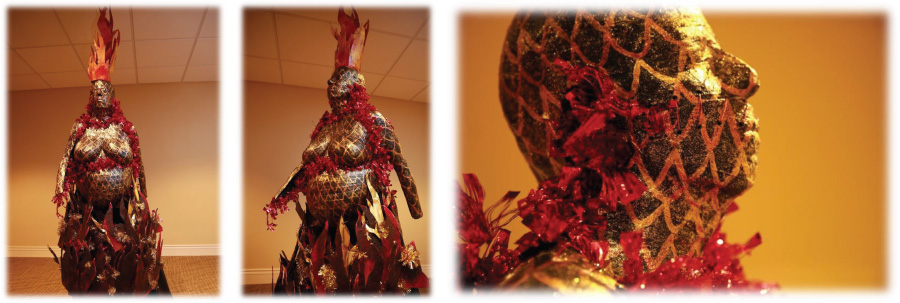
Artist: Rogers Memorial Hospital – WI
Men and women face daunting challenges in attempting to reclaim their identities from the iron grip of eating disorders, familial and societal expectations, and from their own distortions. This is not a fight that can be won through will power alone. Support for the mind, body, heart, and soul are required as clients stitch back together the scattered pieces of themselves. This is a process of taking power back from the false truths and skewed ideals of the eating disorder.
To honor this process of rebirth and renewal we created this mixed media sculpture. The body is composed of plaster casts from seven different healthy, confident women. One woman was pregnant and, at a time when many women hide their bodies, she celebrated the twins growing within. Another woman had undergone breast reduction surgery to promote her ongoing health while a third tirelessly fights on the front line of eating disorder treatment in a psychiatric facility. The vibrant personalities of these women shine through the embellishments while their strength is evident in the metallic elements. As our clients learn to stitch themselves back together, we honor that struggle, and the trials that occur in the fight, through the image of this woman rising from the flames. She stands tall, proud, and crowned with flames as homage to her journey through darkness, tribulations, and fire towards rebirth. She steps from the flames and walks confidently forward–in the direction of her life.
We dedicate this sculpture to the amazing strength and resilience of all the men and women who walk through the halls of Rogers Memorial Hospital on their journey towards wholeness and health. May you always walk confidently in the glow of your own strength and leave the shadows of distortion behind.
Materials:
Plaster cast, wire, acrylic paint, spray paint, cardboard, sheet metal, holiday garlands.
Artist Profile:
Lacie West, MA and Laura Teoli, MS, ATR, LPC are art therapists working with clients at a variety of levels of care at Rogers Memorial Hospital in Wisconsin. They collaborated on this project out of a joint passion to give voice to their clients through art and as a way to honor the resilience and strength of their clients who, despite the odds, fight and overcome eating disorders every day.
The Return of the Wild Woman
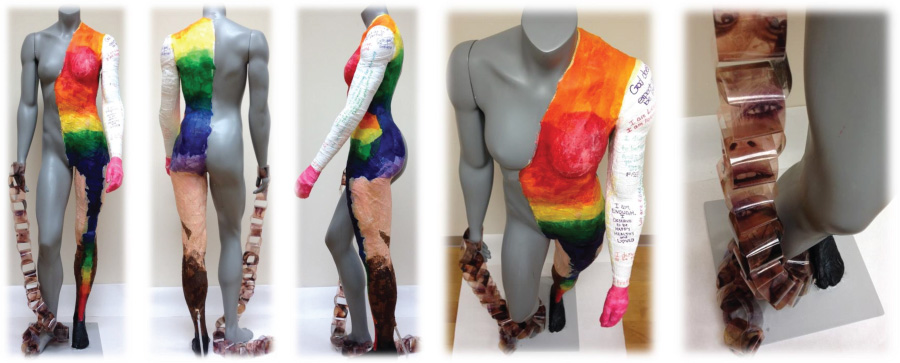
Artist: University of Florida Health Eating Disorder Recovery Center – FL
“Within every woman there is a wild and natural creature, a powerful force, filled with good instincts, passionate creativity, and ageless knowing. Her name is Wild Woman, but she is an endangered species. Though the gifts of the wildish nature come to us at birth, society’s attempt to “civilize” us into rigid roles has plundered this treasure, and muffled the deep, life-giving messages of our own souls.” ~Clarissa Pinkola Estés (Women Who Run With the Wolves)
This mannequin was inspired by the book, “Women Who Run with the Wolves: Myths and Stories of the Wild Woman Archetype” by Clarissa Pinkola Estés, and created over the course of several art therapy sessions. Through myths and storytelling the group explored what happens when the female spirit becomes tamed and imprisoned by the eating disorder and what it looks and feels like to embody the wild, wise, creative, intuitive nature that is the female soul.
The gray side of the mannequin reflects the loss of energy, vitality, and vibrancy that occurs as a result of the eating disorder. The group created a chain from magazine images transferred onto clear tape representing false ideals of feminine beauty propagated by the media and wrapped it around the mannequin’s thin leg, keeping her stuck and enslaved.
The colorful side of the mannequin reflects the process of healing from the inside out and the “rewilding” of the female soul. The group layered this side of the mannequin with plaster strips and talked about the often painful process of healing what is “broken” (body, mind, and spirit). The participants chose to keep the arm looking like a cast and “signed” the cast with personal affirmations such as, “I am enough” and “I deserve to be loved”.
Colored tissue paper was layered over the plaster as the group “fleshed out” the mannequin and brought her more fully to life. As they circled around the mannequin self-symbol, applying layers of vibrant color with gentle brushstrokes, they embodied gestures of self-care and self-love. The participants recalled memories of times they felt fully alive and connected to their Wild Woman selves and renewed their motivation for recovery.
Materials:
Plaster gauze strips, tissue paper, glue, permanent marker, magazine collage, clear packaging tape.
Artist Profile:
“The Return of the Wild Woman” was created by patients at the UF Health Eating Disorder Recovery Center in Gainesville, FL under the guidance of art therapist Genevieve Camp, MA, ATR-BC, LMHC.
Light From Within

Artist: Castlewood at Monarch Cove PHP/IOP – CA
The project began with an intensive reflection on the mannequin. She had imperfections to illustrate a life lived and having been on a journey of her own. Her neck was jagged and skin tone uneven. Her torso was narrow and had a tear that cut through her stomach. The position of the body appeared forced, creating a sense of being exposed. The mannequin’s shape and body position brought up reflections on how men and women struggle with feeling objectified and pressured to meet society’s expectations of an ideal body. The group decided that a healthy body image began internally and that it was essential to accept the flaws that the mannequin arrived with. The group shared that they felt a sense of empowerment to be part of the mannequin’s transformation.
Hands were created to represent each of the group member’s individual journey. The palms of the hands were positioned toward the mannequin to symbolize offered support and were painted to reflect moving toward recovery. The underside of the hands were painted to illustrate the Eating Disorder. The hands were attached to a tree-like spine so that support could be accessed when needed. Vines were wrapped around the legs of the mannequin to represent being grounded and illustrate internal growth. A heart was cut into the chest cavity to symbolize the vulnerability of self-discovery. Bright tulle and ribbon were inserted into the chest to signify the internal qualities that exist within us all: confidence, compassion, acceptance, self-worth, and love. The placement of the ribbons and tulle represent the beauty of imperfection. A heart was placed on top of the ribbon with a design reminiscent of the recovery symbol to signify the internal drive to recover. The group expressed that they experienced cohesion and a sense of accomplishment through completing this process.
Materials:
Mannequin, paper wrapped steel wire, paper mache, acrylic paint, fabric flowers, glitter, stickers, glue, grapevine ball, Christmas lights, faux vines, tape, wooden dowel, gym weight, tulle, ribbon, paper heart, tissue paper
Artist Profile:
The art piece was created by men and women in the Partial Hospitalization and Intensive Outpatient Programs at Castlewood at Monarch Cove, which provide individualized treatments for Eating Disorders and co-occurring issues. The art piece was created during weekly art therapy groups facilitated by Art Therapist Camille Henson. Special thanks is given to Dietitian Diane Whelan for recommending participation in this year’s contest.
Odyssey
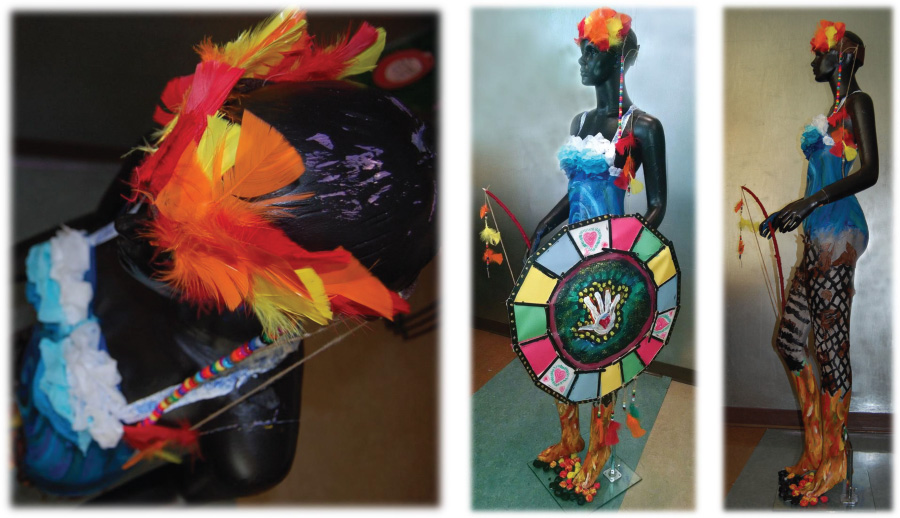
Artist: Eating Recovery Center IP/Res – CO
To decorate this mannequin, patients from three villages generated metaphors similar to the process of regaining a healthy body image. The progression of these stories is reminiscent of Homer’s poem, “The Odyssey.” Like the poem’s journey, which should have taken weeks but instead took years, recovering a healthy body image is not as easy as one might think.
Part of the reason Odysseus’ journey takes so long is because he encounters antagonists and mythical creatures along the way. Often the first “antagonist” a person with an eating disorder encounters is ambivalence about seeking help. ERC patients depicted this ambivalence on the mannequin’s feet and calves, comparing the process of entering treatment to being dragged over hot coals against one’s will.
The next phase of the journey, portrayed on the knees and thighs, involves encountering the mythical “Snake.” Many patients can make progress only once they are willing to shed the skin of dysfunctional behaviors they have adopted in order to survive.
Once the layers of defensiveness are peeled away, then comes the arduous task of facing emotions that have long been avoided. Numbing oneself from emotions often gives them almost mystical power, and learning to tolerate unwanted emotions can be difficult. This task, as well as that of enduring the intense physical discomfort resulting once healthy eating is resumed, is portrayed by the churning waters in the stomach area. The ups and downs of this part of the journey are shown as choppy waves on the mannequin’s breasts.
A crucial element of embracing healthy body image often involves embracing one’s power and strength, depicted by the handprint on the shield and the chieftain’s headdress. This character, like Odysseus, taps into her value of love (hearts on shield) to stay the course on her journey.
Materials:
Mannequin, acrylic paint, felt, feathers, beads, yarn, wooden reed, popsicle sticks, glue, construction paper, glitter, magic markers, tissue paper, model magic clay
Artist Profile:
This mannequin was transformed by patients from three different villages at Eating Recovery Center’s Inpatient/Residential unit for adults in Denver, Colorado. Tamara Herl, LPC, ATR-BC, facilitated the sessions. Ms Herl has more than 23 years of experience helping people of all ages and from all walks of life use creativity as a tool for accessing inner wisdom and achieving full potential.
Nature’s Way
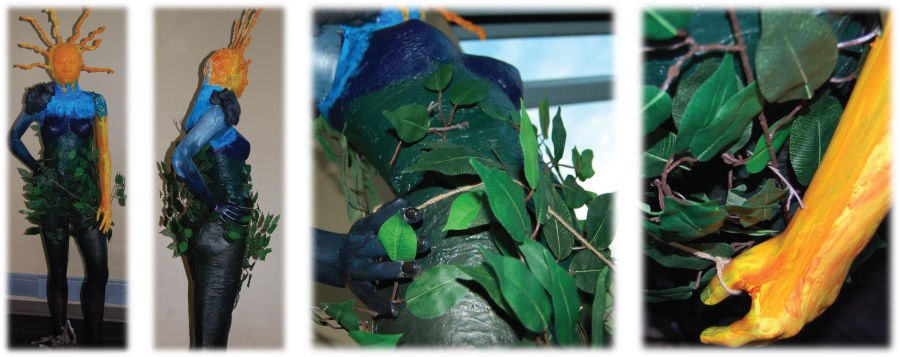
Artist: Eating Recovery Center PHP – CO
Initially, participants changed the physical shape of the mannequin because it appeared too stereotypically thin to them. They portrayed their sense that body image has “layers” with plaster gauze and multiple colors of paint. After a brief hiatus, the project took a different turn when the facilitator posed the questions: “When you think of the journey from where you are now, to having a healthier body image, what does it remind you of? If you could see it as something from nature or something humans have made, what would it be?” Participants were asked these questions after they had ranked their current body image on a scale of zero to ten, with zero equaling a poor body image and ten representing an excellent body image.
Using metaphor to explore the journey to a healthier body image seemed to bring renewed life to the project. One participant reported that when she has a healthy body image, “I won’t have to think about it,” and she compared it to a tree, which is depicted by the leaves, root ball, and both real and artificial branches, as well as artificial leaves. Another person said the journey reminded her of going from hiding a light to not hiding a light, like a sunrise, which is depicted on the mannequin’s arm and face/head. Several other participants used the ocean as a metaphor, noting that it is so changeable, and can be both stormy and sunny. These elements are depicted on the mannequin’s other arm and the chest area.
The title, “Nature’s Way” was given to the image as a reflection of the metaphors used by the artists who created it.
Materials:
Mannequin, newspaper, packing tape, plastic gauze, acrylic paint, brown wrapping paper, root ball, real and artificial twigs, leaves, cardboard mask, fiberfill
Artist Profile:
This mannequin was decorated over the course of several months by patients from two different tracks at Eating Recovery Center’s Partial Hospital unit for adults in Denver, Colorado. Tamara Herl, LPC, ATR-BC, facilitated the sessions. Ms Herl has more than 23 years of experience helping people of all ages and from all walks of life use creativity as a tool for accessing inner wisdom and achieving full potential.
Rewire

Artist: Eating Recovery Center IOP – CO
“The creation of something new is not accomplished by the intellect but by the play instinct.” –Carl Jung
Our sculpture is covered in handmade plaster masks created by group members over a five-week period. Body image is a difficult topic to explore and the group kept circling back to the question, “Does our mannequin have to be all positive?” Our challenge was to reflect on the full range of feelings associated with body image, facing difficult topics like early body memories, self-esteem and values around appearance. The group delved into this body image exploration by making masks as a way to look at the emotions that our group were trying to disguise or protect themselves from – shame, guilt, sadness, anger, and the daily struggles around perfectionism. While the make-up of the group changed from week to week, there was a common thread of play and laughter throughout the process. One group member commented, “I feel like I’m in junior high again”. The mask-making process was indeed an opportunity to revisit earlier versions of the self with new insights and the opportunity to explore past experiences in a safe space. In the final part of our process, group members used armature wire to attach each mask to the body of the mannequin creating something new from the charged and sometimes painful feelings represented on the masks. Just as the process of developing a respectful relationship with one’s body requires a lot of rewiring and relearning, the armature wire was a way to share and re-contextualize the masks and the uncomfortable feelings about body image in the therapeutic group environment. The group took each individual mask and transformed it into a point of connection on the mannequin, as a reminder of the supportive role that therapy can play in this process.
Materials:
Plaster, acrylic paint, armature wire, collage material, found objects
Artist Profile:
Katie Pruitt, MA, LPC, ATR-BC facilitates an art therapy group every Thursday evening as a part of the Eating Recovery Center’s Adult Intensive Outpatient program.
Vulnerability Warrior
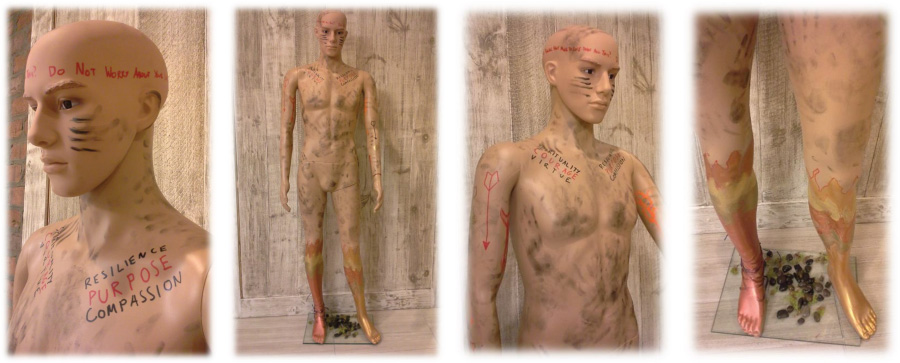
Artist: Veritas Collaborative – NC
The Vulnerability Warrior was created during weekly art therapy groups on the Adolescent Partial Hospitalization Unit at Veritas Collaborative. Group members of multiple gender identities used the mannequin format to address and break away from the traditional masculine body image stereotype of the emotionless, violent warrior. This emerging masculine warrior’s identity reclaimed vulnerability and the ability to bravely express emotions. The legs of the mannequin are adorned with flames. The torso, arms, and head are covered with charcoal handprints to represent transformation and rising above masculine stereotypes to create a new universal identity. The warrior’s battle mission includes strengthening the masculine qualities of resilience, purpose, compassion, spirituality, courage, and virtue.
Materials:
mannequin, paint markers, charcoal, rocks, moss.
Artist Profile:
Veritas Collaborative- in Durham, North Carolina- is a Specialty Behavioral Health Hospital & Center of Excellence for the Treatment of Eating Disorders. With national accreditation from the Joint Commission, we provide Inpatient, Acute Residential, Partial Hospitalization, and Intensive Outpatient levels of care for adolescents ages 10-19. Additionally, we offer Intensive Outpatient services for adults, ages 18+. Veritas Collaborative delivers multidisciplinary, evidence-based care for patients and their families in a warm and inviting environment.
Self-Preservation
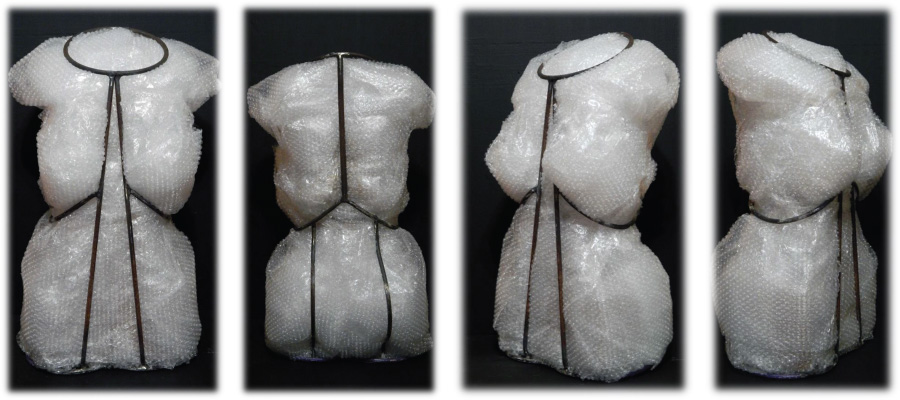
Artist: Rebecca Tishman – MN
This sculpture is a representation of a state of mind I talk about often: self-preservation mode. Buried within this bubble wrap and metal form is a cardboard box. The box holds my thoughts and memories, my mind, soul, heart-everything that makes me uniquely me. It’s all right there, but so far out of reach, so deeply buried that you can no longer see it. Everyone has that part, which is their true self, their genuine self, and their essence. Some let that part shine through everyday, others bury it, keeping it hidden for no one to find, but it still exists. Self-preservation is meant to keep everyone at an arms distance from you. It’s about keeping protective walls up, pushing people away, and just trying to get by, to manage, to survive. It’s not about thriving.
The steel frame acts as a shell, a rigid barrier holding the work together, giving it form. I wrapped the core in bubble wrap and then wrapped it again, and wrapped it again, and again and again within the steel frame. Together the three elements create a feminine torso in which the most apparent qualities are size and shape-the form it takes, the way it looks. It’s about surface, not the depths within. When the steel frame is removed, and the bubble wrap is unwrapped, what’s left is an adorned, unassuming cardboard box, whose size and shape is meaningless, the only thing that matters about this box is what is on the inside. And isn’t that true of every one of us?
Materials:
Steel, bubble wrap, cardboard box, packing tape.
Artist Profile:
Rebecca Tishman (b. New Jersey, 1991) is an interdisciplinary artist working in metal, wood, performance, and installation having exhibited across the country. Her current focus and passion lies in blacksmithing and performance. She practices acroyoga and partner acrobatics, incorporating it all into her art practice. She is concerned with emotions, psychological development and the way the mind works. She has been a guest writer for teen development specialists and body image experts, won the International Association of Eating Disorder Professional’s Art Competition, served as a mentor for the LGBTQIA community, and held community-based programs combatting violence against women. She has been recognized for her outstanding leadership skills and academic achievement.
The Tree of My Body

Artist: Fraser North Eating Disorders Programs with the Ministry of Family Development- Canada
The inspiration for our mannequin was a question: “What makes us to feel good about and within our body?” Through a series of creative exercises and group discussions the idea of a body as a tree was born.
Popular culture relentlessly bombards us with messages of how to be attractive and healthy. We are told to push our bodies through rigorous fitness routines and to manipulate our weight, shape and size through diets and cosmetic procedures. We are told that if we spend enough energy, time and money we will find happiness and health. Unfortunately those elusive goals are rarely achieved through external means. Instead, we often end up feeling depleted, ashamed and ultimately, “never good enough.”
We have focused on reconnecting with the internal wisdom of our bodies. Our body, like a tree, thrives and effortlessly grows when rooted in a nourished soil, exposed to warm sun rays and rain, and protected from harmful elements. During this project, participants had an opportunity to explore what makes them feel happy, and healthy in their bodies, from the inside out rather than the other way around.
The mannequin was transformed into a tree. The participants enhanced its size and shape to resemble a trunk with a head as a crown of a tree. The leaves and greenery sprouting from the head represent the creative power of our minds. The arms of the mannequin evoke tree branches, but also a body posture of someone who feels free and joyful – dancing with arms in the air.
The art piece has an interactive component: the spectators are being invited to add their ideas of “What nourishes the tree of THEIR bodies?” As more people share their experiences the tree is becoming more lush and green.
Materials:
Mannequin, paint, natural burlap fabric, cheesecloth, artificial flower in a pot, artificial green leaves, Christmas ornament wire hooks, pieces of old fabric and newspaper as stuffing, glue, staples, Duct tape, silver sharpies, natural materials (tree bark, brunches, moss..)
Artist Profile:
The Tree of My Body was a collaborative project created by a group of artists: group of girls and women from the Child and Youth as well as Adult Eating Disorder Program supported by a Child and Youth Clinician in an Art Therapy Group during summer 2014. Big Thank You to Kevin L. Smith, Creative Director of Arm & A Leg Company for his generosity in donating the mannequin.
Set Yourself Free, Piece by Piece

Artist: Cambridge Eating Disorder Centers/Adolescent – MA
To us, eating disorder recovery signifies a process of transition and self-exploration. We chose to paint the mannequin transitioning shades of purple, the color of eating disorder awareness and recovery. As you move up the body, the purple hues become lighter and brighter. This transition from dark purple to light purple symbolizes the transition from negative to positive perceptions of self. Wrapped around the mannequin’s ankles are heavy chains, which represents the shackling nature of eating disorders. Metallic puzzle pieces cluster from the bottom to the top of the mannequin. As you move up the body, the puzzle pieces begin to come together more coherently. We chose puzzle pieces to represent every little piece of our lives: our perception of ourselves, our support systems, tools that we use to fight our eating disorders, etc. As the pieces begin to accumulate towards the top half of the mannequin, we are conveying that with increasing self-discovery and insight into our eating disorders, the little pieces of our lives begin to better fit into place. This cohesion and awareness erupts into colorful origami cranes, flying off of the mannequin’s back, shoulders, and neck. The cranes represent the freedom we can gain from a life unhindered by an eating disorder. In one of the mannequin’s hands, you will find a crane. In the other, you will find a handful of the puzzle pieces. These objects demonstrate that we hold the tools necessary to ultimately determine the state of our health and our futures.
Materials:
Mannequin, Crayola washable paint in purple, white and black, assorted origami paper , Hot Glue, Metallic silver spray paint, assorted puzzle pieces ,2ft long steel rods , 20ft coil chains, packaging string
Artist Profile:
This mannequin was created by the adolescent unit at the Cambridge Eating Disorder Center in Cambridge, Massachusetts. This residential unit consists of young women, ages 12-21. The artists would like to stress the importance of teamwork, collaboration, patience, and interpersonal effectiveness in creating a beautiful final product.
The Climb
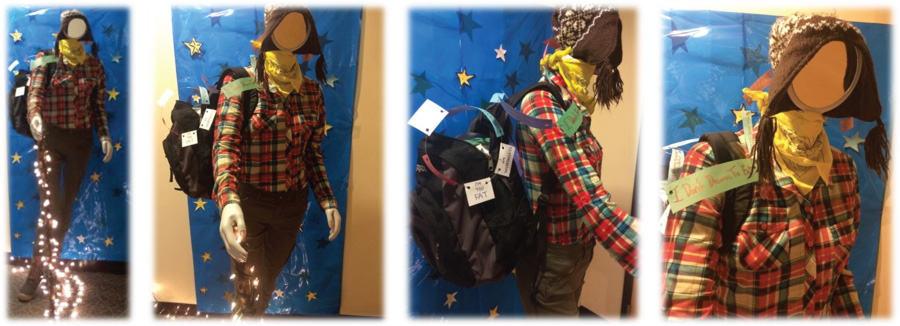
Artist: Cambridge Eating Disorder Centers/Adult – MA
We are all on personal journeys. As we embark on our expeditions, we encounter obstacles that we must learn to accept, challenge, and overcome. Eating disorders are one such obstacle that we must learn defeat. With this in mind, we designed our mannequin to represent a hiker on a journey of recovery. The hiker is set against a nighttime backdrop to demonstrate the lonely and remote nature of eating disorders. From beneath the hiker’s hat flows a stream of automatic negative cognitions that we too easily accept as our reality. In a recent group session, we processed the automatic stream of these negative beliefs. We began to ponder the thought process: where do these thoughts go? It may seem like they fall behind us, and we are able to continue on our journeys like the thoughts do not affect our daily lives. However, over time, these thoughts begin to accumulate and drag us down. We conveyed this concept by streaming the negative thoughts from the hiker’s head into a backpack she is carrying on one shoulder. The backpack is carried on one shoulder to portray that the hiker is in the process of letting the backpack down, which will help her release the heavy burden of these thoughts. The hiker leans on a glowing walking stick, which demonstrates social support, treatment, newly acquired skills, and self-acceptance. The walking stick is glowing to show that even throughout the darkest of nights, supportive elements of our lives will always be there to guide us. The hiker’s face is a mirror, to symbolize the anonymity of the hiker, and how it can be adapted to convey anyone’s journey. Additionally, the mirror demonstrates that no matter where you are in your life and your recovery, you will always be you.
Materials:
Flannel shirt, cargo Pants, hiking boots, knit hat, Jansport backpack ,1 tree branch, white card stock , assorted metallic and glitter cardstock ,Elmer’s glue, Goody’s essential styling mirror, packing tape, fishing wire, Crayola markers, assorted glitter, 20.5inch twinkle lights, blue cellophane wrap
Artist Profile:
This mannequin was created by the adult residential floor at the Cambridge Eating Disorder Center, in Cambridge Massachusetts. The artists collaborated through combined experiences and shared struggles to create a common understanding of eating disorder recovery.
Shine From Within

Artist: Sarah Mullane PhD/The Doctors Health and Wellness Center – AZ
The message conveyed with this mannequin is how true beauty goes beyond aesthetics; true beauty lies beneath the surface and is reflected by our inner being and actions. Rather than using a mannequin form, metal wire was used to represent our body as a simple shell to house our true identity and beauty. The wire allowed the inner beauty to shine through. Lights were used to amplify this message and indicate that even in the darkest of times, inner light and beauty will guide us. The structure is purposely unisex (left side is female – demonstrated by the breast and smaller waist, right side is male- demonstrated by a broad shoulder and wider waist). Both genders are represented to indicate that body image issues are not gender specific. A gold plated rose is positioned as the heart to represent both beauty and blossoming from within. The butterflies also convey beauty, the ability to reinvent ourselves and flying free.
People who have suffered from eating disorders were asked to describe what they saw when they looked in the mirror. The answers are displayed from the head (A-E) where negative thoughts can be our own worst enemy and distort our perception. Others were asked to describe each participant (A-E); these positive answers are displayed in the ‘treasure chest’. The mannequin’s view of the chest is purposefully screened by a distorted mirror to represent how we may be blinded by negative views of ourselves and struggle to see the true beauty others see in us. A key is placed near the ‘heart’, wire connects it to the mirror and through to the ‘treasure chest’. This represents the ‘key’ to blossoming – in essence, we must aspire to see ‘through the looking glass’ to see our own true beauty and be able to ‘Shine From Within.’
Materials:
Metal wire, cardboard, spray paint, foil, foam, glue, glitter, wood and battery powered lights.
Artist Profile:
As a keen sportswoman at school I felt tremendous pressure to look a certain way and developed an eating disorder at the age of 16 to try and pursue this ‘athletic look’. 11 years later, I have since recovered and It continues to shock me how many damaging behaviors are positively reinforced in the sporting world- you can look stereotypically ‘healthy’ and have very unhealthy habits causing long term damage that cannot be seen on the outside. I moved to Phoenix Arizona from the UK 2 years ago to continue my research and volunteer work in the health and wellness industry. As a researcher and Health Coach I strive to communicate the importance of being healthy from the inside out rather than focusing on aesthetic goals. It is my aim to help others as others helped me to see through that looking glass.
Broken and Mended, Stronger Than Before

Artist: Laura Riss, PsyD/Kaiser Permanente – GA
Our mannequin explores the theme of brokenness and the beauty it encompasses. In our confused thinking it is easy to internalize the unrealistic ideals of society. We look at others and think they “have it all together” and see ourselves as broken and worthless. Our inspiration lies in two sources: first, Japanese art of kintsukouri, the repair of broken ceramics with lacquer and metal powders, often gold; and second, Hindu goddess Akhilandeshvari, she who is never not broken. Both celebrate the value of something broken and the beauty and individuality that come with its repair. Ceramics mended with kintsukouri have gold seams and fragments of other ceramics used to fill losses in the original. They are considered more beautiful and valuable because they show their history. Our mannequin is decorated with gold seams to illustrate that our light can shine from within to illuminate our choices. Integrated ceramic fragments are decorated with coping skills.
On her back fragments form wings that allow release from expectations that hold her immobile and unchanging. The goddess Akhilandeshvari stands for joy we can find in brokenness and freedom it gives us. Strength lies in the ability to break apart and then renew ourselves; to pick up the pieces over and over and reassemble them in whatever form we choose, whoever we want to be. The possibilities are endless. Akhilandeshvari traditionally rides a crocodile representing our fears, which are echoed in the crocodile mosaic on the base. By riding the crocodile she conquers these fears and puts them to her own use, rather than allowing them to overwhelm her. The beauty of brokenness lies in the possibilities of our choices and the joy of the reassembly. In the process of being broken and mended we find our truth of who we are meant to be.
Materials:
Mannequin, plaster, rope lights, ceramic plate fragments, markers
Artist Profile:
The women who worked on this project are part of Dr. Riss’ Inner Journey group for women with eating disorders. While the project evolved over several months, we have been part of her therapy groups in the past, so that some of us have known each other for over a year. This history gave us a deeper understanding of each other and let us work intuitively and comfortably together on this project.
Soul Portrait
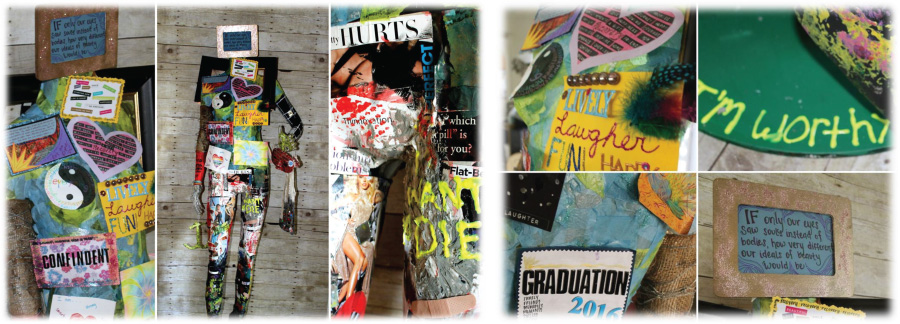
Artist: Shoreline Treatment Center for Eating Disorders – CA
“If only our eyes could see souls instead of bodies, how very different our ideals of beauty would be.”
Regardless of whether one has an eating disorder, the over-culture of our society is fixated on external values from appearance and weight to accomplishments and social / financial status – we seem to be stuck in a pattern of wanting the next best thing and forget about the quality of our internal lives. Nutrition and exercise is often approached from a framework of how far one can push him/herself beyond limits and the external rewards (how do I look?) rather than how it impacts one’s overall health and well-being. When one is in the grips of an eating disorder, these messages of external worth are exasperated and one’s internal life is more and more overshadowed as the disease progresses.
The clients wanted to demonstrate the stark contrast between the manifestation of their eating disorders and their inherit soul beauty. They wanted an outlet to express what life is like in their eating disorder, but also take time to reflect on their deeper selves, their values, dreams, qualities, and passions. The limbs of the mannequin depict the horrors of an eating disorder – being bombarded with images, self-loathing, a fixation on weight and calories, and tortured by what once felt a means to a sense of worth and beauty for many. The torso of the mannequin is covered with the clients’ “soul portraits” – their intrinsic beauty that cannot and will not be stolen by their eating disorder. These are their values and passions that enable them to continue moving towards recovery and offer them hope that they can connect to a sense of worth that is not dependent on the number on a scale or living in the shadowlands of their eating disorder.
Materials:
Picture Frame, tissue paper , collage items (magazines, paints, glue, wire, glitter, etc)
Artist Profile:
Clients participating in PHP and IOP at Shoreline Center for Eating Disorder Treatment collaborated on the vision and implemented the transformation of the mannequin. Shoreline is located in Long Beach, California and offers outpatient therapy, PHP, IOP, and transitional living care (Satori House).
Beauty from Ashes; emerging new hope and life
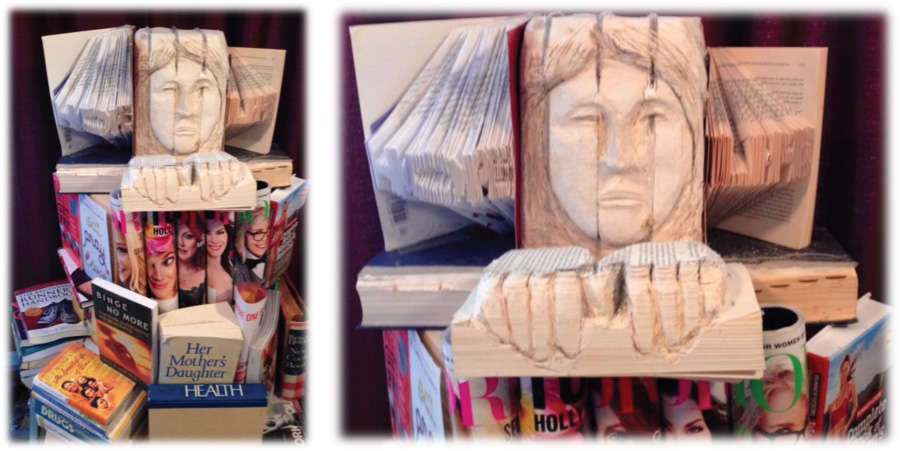
Artist: Eating Disorders Treatment Center – NM
This sculpture is an art piece in which all of our I.O.P. clients have courageously donated a part of their recovery process. The sculpture is a tower of books and printed material that will be an emotional visual for anyone who struggles with an eating disorder. As an art therapist, I find it to be a tower of validation and hope. The print media demonstrates how difficult it is to live free of illusive, retouched images of female, (and male) bodies.
There are old cookbooks, showing how iconic recipes from decades past, can still be found in our kitchens. In the center of the piece, at the top, is a sculpted head from some of these books. This head is a metaphor for the client who struggles with an eating disorder. She appears to be in the beginning stages of forming a new body from the chaos of the illusions around her. It was a challenge to sculpt this head, because we did not want her image to represent any particular culture or nation. However, her struggle is apparent and it is clear that she is in the beginning of her recovery, emerging from the illusions that have helped birth her eating disorder.
When choosing the media for this piece, I wanted to create an image from the illusive media in print. The words and images projected through this medium are echoed in our client’s behaviors and modes of thought and expression. As an art therapist, it is clear to me, as well as my clients, that media can contribute to eating disordered behavior, but with therapy and support, it is possible for a client to find a way out of her eating disorder.
Materials:
Women’s magazines, like fitness and fashion, books on eating disorders, books on exercise and a couple of general health books.
Artist Profile:
IOP clients of Eating Disorders Treatment Center in Albuquerque, New Mexico assisted by Art Therapist Pat Lopez.
A Caged Spirit
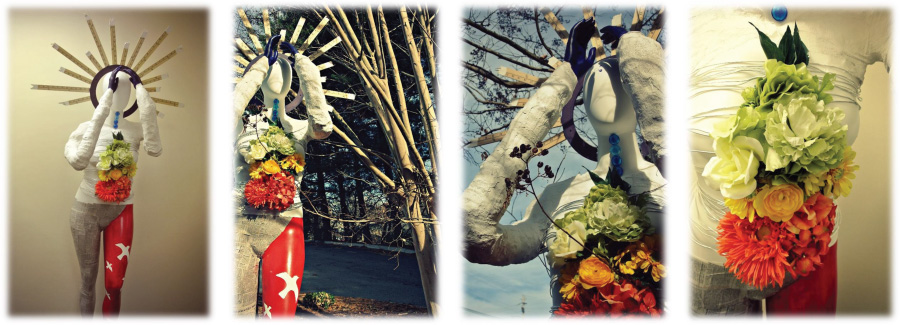
Artist: Willow Place – NC
Quan Yin – “Born of the Lotus”
A CAGED SPIRIT – seeking an outlet, trapped yet comfortable and scared to come out. With a complete misunderstanding, a wrong sense of safety, and creating illusions in her mind, the disorder has taken over. The goddess here portrays the love, freedom, and hope that grows as we overcome an eating disorder. The connection to her inner, soul self is what allows her to shine bright and radiate beauty. Her divine feminine is now expressed truly. She no longer is trying to escape reality but instead, escape the cage in which she has been living.
This goddess represents the hope we live with on a daily basis and emphasizes that balancing chakras and emotions are the solution to a freeing, joyful life. Rulers protruding out of the head represent the comparisons which we often obsess over; using our crown chakra (violet) our knowledge and understanding become more reflective of our worth. The hands are in prayer pose located at the third eye (indigo) inviting in right thought and intuition. Her truth is conveyed through her throat chakra (blue) where we learn how to become honest with ourselves; exposed as it seems, the milestones show otherwise. The wire represents the trapped emotions; the flowers illustrate the transformation of thoughts and feelings of guilt and shame (orange and yellow) protruding through the walls we build. As a result the divine expression of the beautiful, soul self is released from the heart chakra (green). Providing a strong root (red) chakra, the goddess stands grounded and free from survival mode. This is the connection to Earth and demonstrates reconnecting with source. Doves define the hope we have to live free of obsessive thoughts represented by the news print. As we eliminate our black and white thinking, as well as those stories that we tell ourselves, we become willing, open minded, and open-hearted.
Materials:
Yardsticks, wooden circle, acrylic paint, wire, flowers, newsprint, fabric, plaster/mache
Artist Profile:
A Caged Spirit was created by clients at Willow Place Asheville a dual diagnosis treatment center for substance abuse and eating disorders. This group’s work reflects the principle that recovery is a journey in which one is willing to look inward and be vulnerable with both self and others. Commitment to this journey leads to stability, healing and hope.
Seasons of Recovery
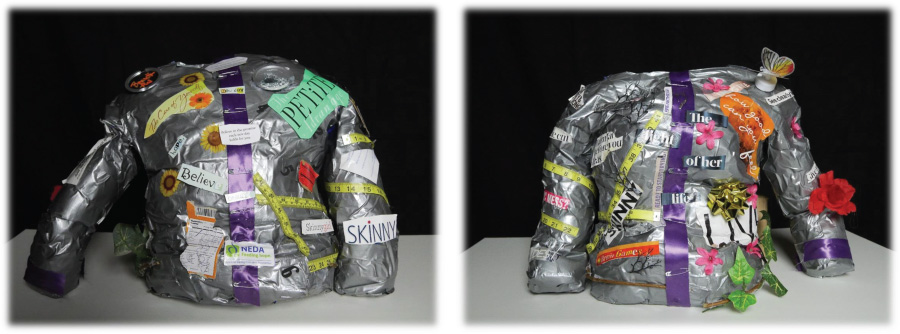
Artist: Rebecca Brennan – NY
“In the depth of winter, I finally learned that within me there lay an invincible summer.” ― Albert Camus
When I first began my journey of recovery, I read the book Wintergirls by Laurie Halse Anderson. Thinking about that book when beginning this project, my hope was to display my journey of recovery in a way that was a changing of seasons. I included a vine without leaves to show that I couldn’t bloom at that time, as things are in the dead of winter. I included different phrases that I found in magazines in order to display what the inside of my eating disorder brain looked like. The safety pins were placed there to symbolically hold me together throughout that process which represents the support system that I had during that time, my doctors, teachers, friends, family and my counselor who all had a large part in my recovery.
The other side represents my life now as I move forward with a healthier thought process. There are leaves on the vine and flowers which show that I am in the spring of my life on my way into the summer, the season of life and growth. I placed a butterfly on the shoulder because it is a reminder of the beauty of a long journey as a butterfly goes through stages to be able embrace its true beauty. This mannequin was created using my own body by wrapping duct tape around my torso. I have created a work of art with my body and displayed my journey for you. It may not be perfect, all of the pieces may not stay on, but what I have learned on my journey is that it doesn’t need to be perfect to be beautiful and meaningful.
Materials:
Duct tape, ribbon, safety pins, magazine clippings, fake flowers, fake vines, fake spiders, adhesive numbers, measuring tape, nutrition labels, compact mirror, fake butterfly, pieces of gum, rocks, hot glue gun, stuffed with old clothes that no longer fit.
Artist Profile:
My name is Rebecca Brennan and I am currently entering my last semester of my graduate school program at SUNY Oswego majoring in Mental Health Counseling. I have been in recovery from Anorexia Nervosa for going on six years now, and I hope to be a Certified Eating Disorders Specialist in a few years. When my co-worker who is a CEDS suggested this contest, I expected it to be a very interesting experience. What I ended up getting from it is something more valuable than I can describe, turning my body into a work of art and displaying my journey as well as looking back and seeing how far I have come was truly an amazing feeling.
Warrior

Artist: The Renfrew Center of Northern New Jersey – NJ
The group found the mannequin to appear underweight so they built her up to a size they were more comfortable with using bubble wrap and masking tape. They then transformed the size and shape some more by covering and recovering her with strips of newspaper and paper mache paste. The newspaper was allowed to show becoming the “skin” of the warrior because it represents the objective view of the world instead of the subjective one represented in other forms of media. The mannequin was then styled to show symbolic representation of the inner warrior. The warrior theme was used to represent the outward display of incredible strength and courage each of us has within. “Warriors are not born and they are not made…Warriors create themselves through trial and error, pain and suffering, and their ability to conquer their own faults…” The warrior tackles the tasks and challenges it takes to move beyond negative body image and/or an eating disorder. It takes courage and strength to battle against negative body image in today’s world. The web ensures that we are drowning in visuals: we’re no longer comparing ourselves to people we are familiar with, instead we’re comparing ourselves to social-networked strangers, celebrities, and to Photo shopped images, of which we are being exposed to thousands per week. The warrior that lives in each of us battles against the messages from the media telling us to feel shamed or disempowered because we do not meet their ideal size and shape for all womankind. She is grounded in her belief that a life without the pain, anguish and defeat that come from poor body image and disordered eating is something worth fighting for. We are all warriors: showing courage in our battle, experiencing the fight.
Materials:
Mannequin, bubble wrap, masking tape, recycled newspapers, paper mache paste, bamboo sticks, goose feathers, leather scraps, electrical tape, jute twine, insulation tape, arrow heads, paint, recycled packaging materials, steel wire, moss, hula hoop, spray paint, plastic planter, shelf liner, natural material, river rocks, metal worm drive clamp and flexaluminum dryer duct.
Artist Profile:
The mannequin was conceptualized, designed, and created by members of the day treatment program at The Renfrew Center of Northern New Jersey as part of the healing and recovery process. Individuals came together as a community to inspire, create and support. Over 30 artists participating in bi-weekly art therapy groups across the span of a 15 week period, ranging in age from 14 to 61 contributed to the group project. Our goal was to foster positive interaction with body image through a group art making project. Completed with the guidance of Art Therapist Stacy Lieberman ATR-BC, CCLS.





